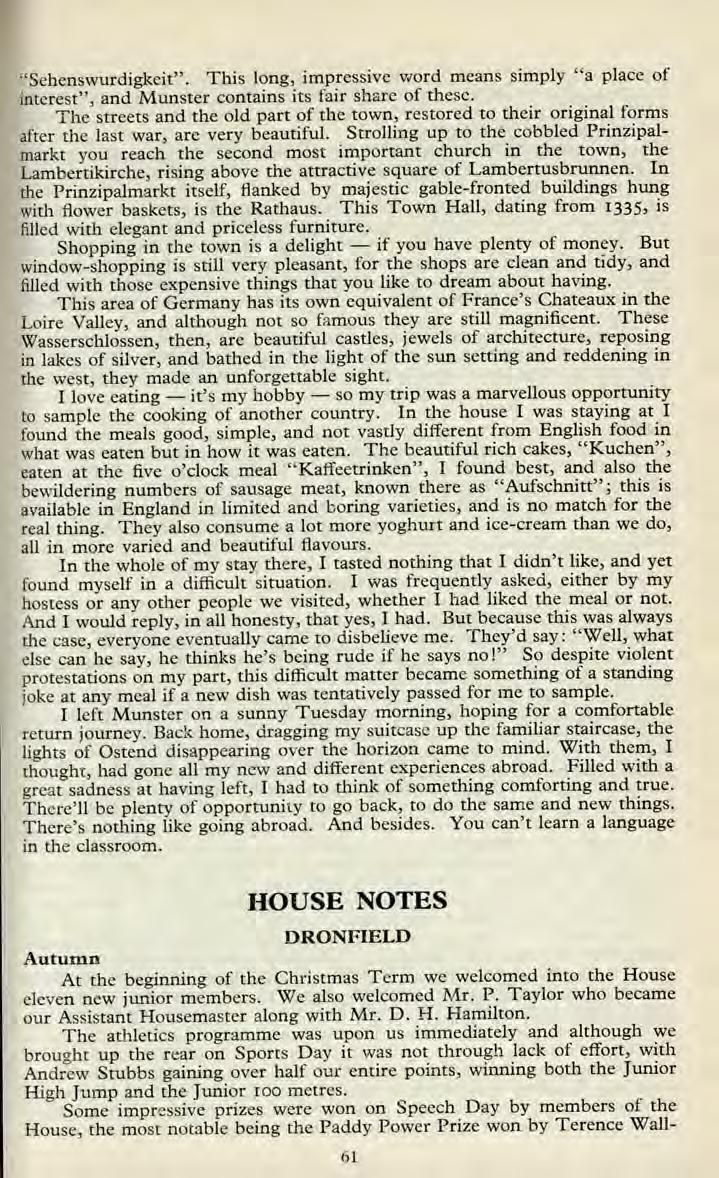I
"Sehenswurdigkeit". This long, impressive word means simply "a place of interest", and Munster contains its fair share of these. The streets and the old part of the town, restored to their original forms after the last war, are very beautiful. Strolling up to the cobbled Prinzipalmarkt you reach the second most important church in the town, the Lambertikirche, rising above the attractive square of Lambertusbrunnen. In the Prinzipalmarkt itself, flanked by majestic gable-fronted buildings hung with flower baskets, is the Rathaus. This Town Hall, dating from 1335, is filled with elegant and priceless furniture. Shopping in the town is a delight — if you have plenty of money. But window-shopping is still very pleasant, for the shops are clean and tidy, and filled with those expensive things that you like to dream about having. This area of Germany has its own equivalent of France's Chateaux in the Loire Valley, and although not so famous they are still magnificent. These Wasserschlossen, then, are beautiful castles, jewels of architecture, reposing in lakes of silver, and bathed in the light of the sun setting and reddening in the west, they made an unforgettable sight. I love eating — it's my hobby — so my trip was a marvellous opportunity to sample the cooking of another country. In the house I was staying at I found the meals good, simple, and not vastly different from English food in what was eaten but in how it was eaten. The beautiful rich cakes, "Kuchen", eaten at the five o'clock meal "Kaffeetrinken", I found best, and also the bewildering numbers of sausage meat, known there as "Aufschnitt"; this is available in England in limited and boring varieties, and is no match for the real thing. They also consume a lot more yoghurt and ice-cream than we do, all in more varied and beautiful flavours. In the whole of my stay there, I tasted nothing that I didn't like, and yet found myself in a difficult situation. I was frequently asked, either by my hostess or any other people we visited, whether I had liked the meal or not. And I would reply, in all honesty, that yes, I had. But because this was always the case, everyone eventually came to disbelieve me. They'd say: "Well, what else can he say, he thinks he's being rude if he says no!" So despite violent protestations on my part, this difficult matter became something of a standing joke at any meal if a new dish was tentatively passed for me to sample. I left Munster on a sunny Tuesday morning, hoping for a comfortable return journey. Back home, dragging my suitcase up the familiar staircase, the lights of Ostend disappearing over the horizon came to mind. With them, I thought, had gone all my new and different experiences abroad. Filled with a great sadness at having left, I had to think of something comforting and true. There'll be plenty of opportunity to go back, to do the same and new things. There's nothing like going abroad. And besides. You can't learn a language in the classroom.
HOUSE NOTES DRONFIELD Autumn At the beginning of the Christmas Term we welcomed into the House eleven new junior members. We also welcomed Mr. P. Taylor who became our Assistant Housemaster along with Mr. D. H. Hamilton. The athletics programme was upon us immediately and although we brought up the rear on Sports Day it was not through lack of effort, with Andrew Stubbs gaining over half our entire points, winning both the Junior High Jump and the Junior too metres. Some impressive prizes were won on Speech Day by members of the House, the most notable being the Paddy Power Prize won by Terence Wall61


















